高考英语语法复习--形容词与副词
高考英语复习形容词和副词知识点讲解讲义(必考点)
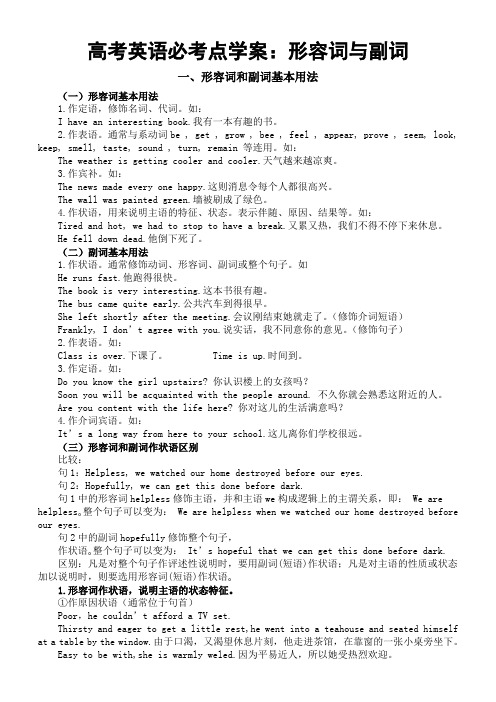
高考英语必考点学案:形容词与副词一、形容词和副词基本用法(一)形容词基本用法1.作定语,修饰名词、代词。
如:I have an interesting book.我有一本有趣的书。
2.作表语。
通常与系动词be , get , grow , bee , feel , appear, prove , seem, look, keep, smell, taste, sound , turn, remain 等连用。
如:The weather is getting cooler and cooler.天气越来越凉爽。
3.作宾补。
如:The news made every one happy.这则消息令每个人都很高兴。
The wall was painted green.墙被刷成了绿色。
4.作状语,用来说明主语的特征、状态。
表示伴随、原因、结果等。
如:Tired and hot, we had to stop to have a break.又累又热,我们不得不停下来休息。
He fell down dead.他倒下死了。
(二)副词基本用法1.作状语。
通常修饰动词、形容词、副词或整个句子。
如He runs fast.他跑得很快。
The book is very interesting.这本书很有趣。
The bus came quite early.公共汽车到得很早。
She left shortly after the meeting.会议刚结束她就走了。
(修饰介词短语)Frankly, I don’t agree with you.说实话,我不同意你的意见。
(修饰句子)2.作表语。
如:Class is over.下课了。
Time is up.时间到。
3.作定语。
如:Do you know the girl upstairs? 你认识楼上的女孩吗?Soon you will be acquainted with the people around. 不久你就会熟悉这附近的人。
(完整版)高考英语形容词与副词考点归纳

B. large
white German C. white large German
• D. German large white
ห้องสมุดไป่ตู้
• 2. ________ students are required to take part in the boat race. (浙江卷)
• A. Ten strong young Chinese B. Ten Chinese strong young C. Chinese ten young strong D. Young strong ten Chinese
• here, there, home, abroad, below等表 示地点或方位的词及today, tomorrow, yesterday, back, out等表示时间或动词 方向词还可以作定语。如:
• Tom isn’t here. (here作表语)
• The people there were very kind to us. (副词there作定语,修饰people)
• A. so well
B. so good
• C. well enough D. good enough
• 2. If I had ________, I’d visit Europe, stopping at the small interesting places.
• A. a long enough holiday B. an enough long holiday C. a holiday enough long D. a long holiday enough
• A.形容词短语作定语时要后置。
• ________ to take this adventure course will certainly learn a lot of useful skills.
高三英语语法-形容词和副词复习
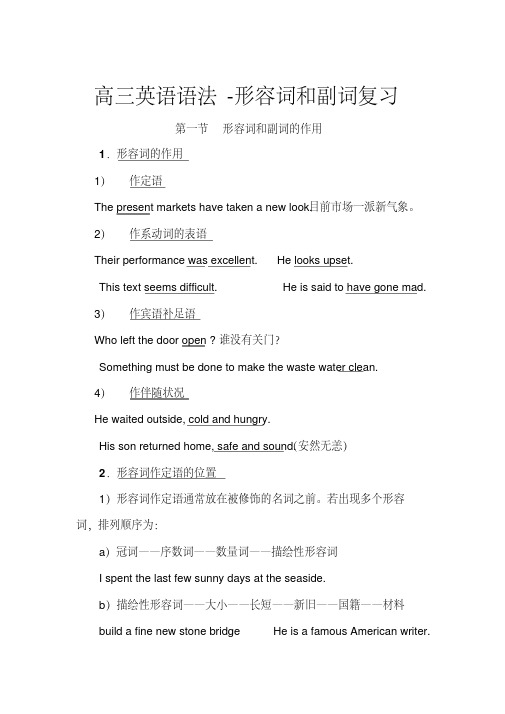
高三英语语法-形容词和副词复习第一节形容词和副词的作用1.形容词的作用1)作定语The present markets have taken a new look. 目前市场一派新气象。
2)作系动词的表语Their performance was excellent. He looks upset.This text seems difficult. He is said to have gone mad.3)作宾语补足语Who left the door open ? 谁没有关门?Something must be done to make the waste water clean.4)作伴随状况He waited outside, cold and hungry.His son returned home, safe and sound.(安然无恙)2.形容词作定语的位置1)形容词作定语通常放在被修饰的名词之前。
若出现多个形容词,排列顺序为:a)冠词——序数词——数量词——描绘性形容词I spent the last few sunny days at the seaside.b)描绘性形容词——大小——长短——新旧——国籍——材料build a fine new stone bridge He is a famous American writer.2)下列三种情况定语后置a)短语He was the only person awake at the moment.b)修饰不定代词If anything unusual happens, let me know.c)“a”开头的形容词He is the greatest artist alive today. 他是在世最伟大的艺术家。
Time alone will show who was right.(time alone=only time)只有时间能证明到底谁正确。
高中英语语法系列――形容词和副词

高中英语语法系列――形容词和副词[知识梳理]一、形容词的概念与用法形容词(adjective)用以修饰名词,表示人或事物的特征。
它可在句中充当定语,修饰名词、代词;可以作表语或宾(主)语的补足语,表示主语或宾语的状态、特征;有时也可以作状语。
如:This is a beautiful school.这是一所美丽的学校。
(作定语,修饰名词school)I have something important to tell you.我有些重要的事要告诉你们。
(作定语,修饰不定代词something)Our school is beautiful.我们学校很美丽。
(作表语)We’ll make our school more beautiful.我们要使我们的学校更美丽。
(作宾补)Our school will be made more beautiful.我们的学校将会变得更美丽。
(作主补)He got home late that night, hungry and tired.那天晚上他很迟才回来,又累又饿。
(作状语)二、副词的概念与用法副词(adverb)用以修饰动词、形容词或其它副词。
它在句中主要作状语,个别副词也可作表语、定语、或宾(主)语补足语。
He studies hard.他学习很努力。
(作状语,修饰动词)I’m terribly sorry for being late. 非常抱歉,我迟到了。
(作状语,修饰形容词)This coat fits him very well.这件上衣他穿着很合适。
(作状语,修饰副词)The people here are kind to us.这里的人对我们很好。
(作定语,修饰The people)When will you be back? 你什么时候回来?(作表语)三、形容词与副词的转换有的形容词加上ly后可转换成副词,规则如下:注意:friendly, motherly, lovely等词虽然以ly结尾,但不是副词,而是形容词。
高考英语 语法总复习 7 形容词和副词

• 13.One of the________(bad) gift choices I ever made was for my high school English teacher,Ms Chen.
<乙)用“less+原级+than”表示。 • Seeking information on the Internet is more convenient
than searching in a library.
• 在实际运用中,than从句常常省略,要通过上下文 来理解。
• Traveling from place to place is now so much cheaper and easier.
• 5.Hardly had Sabrina finished her words when Albert said________(sharp),“Don’t be so mean,” pointing a finger of warning at her.
• 6.Raymond’s parents wanted him to have the________(well)possible education.
原级”表示“越来越……”,其反义词组为“less and less+原级”。
• In many ways my disability has made me grow more and more independent.
• (2)“the+比较级,the+比较级”表示“越……, 就越……”。
• The more upset I got,the less I was able to concentrate.
高考英语语法之形容词和副词

高考英语语法之形容词和副词第一部分考点精讲精练第1讲比较级考点1.可以修饰比较级的词常用来修饰比较级的词或短语有:a bit, a little, rather, much, far, by far, many, a lot, a great deal, any, still, even等。
by far的用法:用于强调,意为“……得多” “最最……” “显然”等,可修饰形容词或副词的比较级和最高级,通常置于其后,但是若比较级或最高级前有冠词,则可置于其前或其后。
如:It’s quicke r by far to go by train. 乘火车要快得多。
She ran fastest by far. 她跑得最快(显然她跑得最快)。
He’s by far the cleverer student.他是个聪明得多的孩子。
He is by far the best teacher.=He is the best teacher by far.他是最最好的老师(或他显然是最好的老师)。
1.You are such a woman as always think ____ ofyourself than others.A. muchB. much moreC. littleD. much less2.【2004福建】The number of people present at theconcert was _____than expected. There were many ticket left.A. much smallerB. much moreC. much largerD. many more3.-The novel is, I have to say, not a bit interesting,How do you find it?-Why! It’s ____________ that I have ever read.A. a most interestingB. a more interestedC. a less interestingD. by far the most interesting4.【2007 全国II】After two years’ research, we no whave a ____ better understanding of the disease.A. veryB. farC. fairlyD. quite 5.------ The disease he suffers is not easy to cure.------ I know, but is he _____ better?A. muchB. ratherC. anyD. little6.【2000上海】You're standing too near the camera.Can you move ______ ?A. a bit farB. a little fartherC. a bit of fartherD. a little far7.【2006江苏】I wish you’d do ________ talking andsome more work. Thus things will become better.A. a bit lessB. any lessC. much moreD. a little more考点2.more 、much与比较级more 和多音节形容词和副词一起构成比较级,如more interesting, more exciting单音节词和部分双音节词在后面加-er构成比较级. 如:taller, earlier, hottermuch修饰比较级。
高中英语高考形容词与副词常考考点整理复习
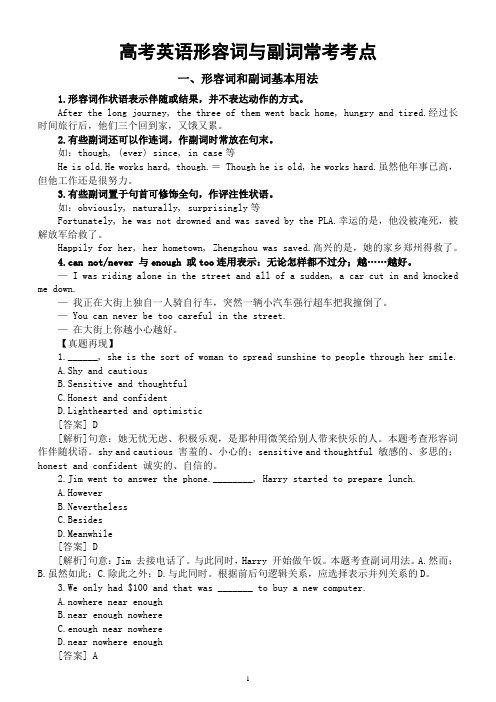
高考英语形容词与副词常考考点一、形容词和副词基本用法1.形容词作状语表示伴随或结果,并不表达动作的方式。
After the long journey, the three of them went back home, hungry and tired.经过长时间旅行后,他们三个回到家,又饿又累。
2.有些副词还可以作连词,作副词时常放在句末。
如:though, (ever) since, in case等He is old.He works hard, though.= Though he is old, he works hard.虽然他年事已高,但他工作还是很努力。
3.有些副词置于句首可修饰全句,作评注性状语。
如:obviously, naturally, surprisingly等Fortunately, he was not drowned and was saved by the PLA.幸运的是,他没被淹死,被解放军给救了。
Happily for her, her hometown, Zhengzhou was saved.高兴的是,她的家乡郑州得救了。
4.can not/never 与enough 或too连用表示:无论怎样都不过分;越……越好。
— I was riding alone in the street and all of a sudden, a car cut in and knocked me down.—我正在大街上独自一人骑自行车,突然一辆小汽车强行超车把我撞倒了。
— You can never be too careful in the street.—在大街上你越小心越好。
【真题再现】1.______, she is the sort of woman to spread sunshine to people through her smile.A.Shy and cautiousB.Sensitive and thoughtfulC.Honest and confidentD.Lighthearted and optimistic[答案] D[解析]句意:她无忧无虑、积极乐观,是那种用微笑给别人带来快乐的人。
高考英语语法-形容词和副词

靠近,nearly几乎;short短,shortly不久;close靠近,
closely严格地,仔细地;free免费,freely无拘束地;deep 深(表示具体深度),deeply深深地(表示抽象深度);wide宽, widely广泛地;high高,highly高度地;direct直接地, directly立刻;loud大声,loudly喧闹。
A.have I felt
C.I have felt
B.I had felt
D.Had I felt
解析:考查时态及倒装。由句意知应选现在完成时; 表示否定意义的副词seldom“很少”放在句首,句子用部 分倒装形式,所以选A。 答案:A
8.下列词都可以用作副词,但词义不同 hard努力,hardly几乎不;late迟,lately最近;near
三、形容词和副词的级 1.比较等级的构成
(1)单音节和少数双单节形容词
原级 great clever brave simple hot big 比较级 greater cleverer braver simpler hotter bigger 最高级 greatest cleverest bravest simplest 构成方法 一般的单音节及少数双音节 词,在词尾加上-er或-est 词尾是不发音的e时,只加-r 或-st 重读闭音节词尾是一个辅音 字母,需重复辅音字母,再 加-er或-est
这样考过
③(上海)The Great Wall is ________ tourist attraction that millions of people pour in every year. A.so a well-known C.such well-known a B.a so well-known D.such a well-known
高考英语形容词与副词考点归纳
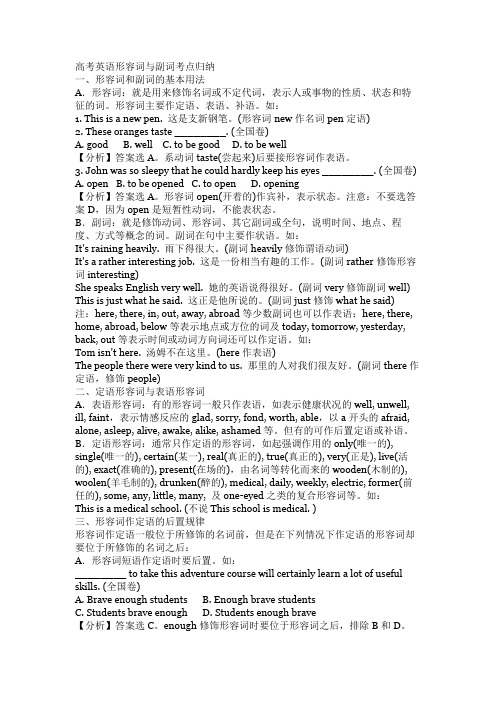
高考英语形容词与副词考点归纳一、形容词和副词的基本用法A.形容词:就是用来修饰名词或不定代词,表示人或事物的性质、状态和特征的词。
形容词主要作定语、表语、补语。
如:1. This is a new pen. 这是支新钢笔。
(形容词new作名词pen定语)2. These oranges taste ________. (全国卷)A. goodB. wellC. to be goodD. to be well【分析】答案选A。
系动词taste(尝起来)后要接形容词作表语。
3. John was so sleepy that he could hardly keep his eyes ________. (全国卷)A. openB. to be openedC. to openD. opening【分析】答案选A。
形容词open(开着的)作宾补,表示状态。
注意:不要选答案D,因为open是短暂性动词,不能表状态。
B.副词:就是修饰动词、形容词、其它副词或全句,说明时间、地点、程度、方式等概念的词。
副词在句中主要作状语。
如:It's raining heavily. 雨下得很大。
(副词heavily修饰谓语动词)It's a rather interesting job. 这是一份相当有趣的工作。
(副词rather修饰形容词interesting)She speaks English very well. 她的英语说得很好。
(副词very修饰副词well) This is just what he said. 这正是他所说的。
(副词just修饰what he said)注:here, there, in, out, away, abroad等少数副词也可以作表语;here, there, home, abroad, below等表示地点或方位的词及today, tomorrow, yesterday, back, out等表示时间或动词方向词还可以作定语。
高三英语语法总复习——形容词和副词
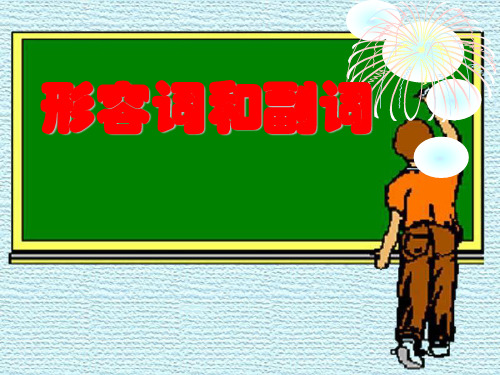
2)有些以-ly 结尾既为形容词,也为副词。 daily,weekly,monthly,yearly,early The Times is a daily paper. It is published daily.
1.There are some (dead )leaves on the ground. 地上有些枯叶。
2.The terrorist's attack caused more than three hundred (death).
恐怖分子的袭击造成了3百人的伤亡。
3.The roar of the explosion was followed by a (deathly) silence.
interesting because of its association with persons or events in history: 具有历史意义的首次太空旅行。而且也 用于形容那些因与历史事件或人物有联系而有名或有趣的事物:
a historic house. Historicalrefers to whatever
3. worthwhile 可作表语和定语 It is worthwhile to do或 It is worthwhile doing
dead --- deadly --- deathly
dead adj.死的, 无感觉的, 呆板的, 不流动的, (语言、习惯)废 弃了的, 熄灭的 n.死者 adv.完全地, 绝对的, 突然的 death n.死, 死亡, 致死的原因, 毁灭, 屠杀 deadly adj.致命的, 势不两立的, 死一般的, 极度的, 必定的 deathly adj.死一般的 adv.象死一样地
高中英语语法知识:形容词和副词
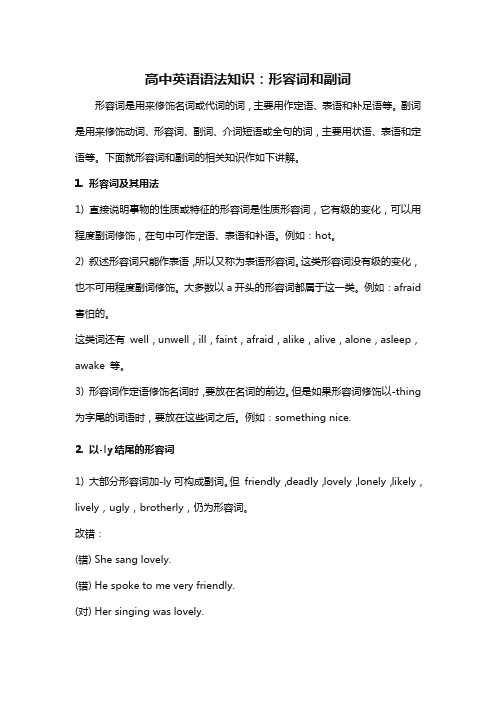
高中英语语法知识:形容词和副词形容词是用来修饰名词或代词的词,主要用作定语、表语和补足语等。
副词是用来修饰动词、形容词、副词、介词短语或全句的词,主要用状语、表语和定语等。
下面就形容词和副词的相关知识作如下讲解。
1. 形容词及其用法1) 直接说明事物的性质或特征的形容词是性质形容词,它有级的变化,可以用程度副词修饰,在句中可作定语、表语和补语。
例如:hot。
2) 叙述形容词只能作表语,所以又称为表语形容词。
这类形容词没有级的变化,也不可用程度副词修饰。
大多数以a开头的形容词都属于这一类。
例如:afraid 害怕的。
这类词还有well,unwell,ill,faint,afraid,alike,alive,alone,asleep,awake 等。
3) 形容词作定语修饰名词时,要放在名词的前边。
但是如果形容词修饰以-thing 为字尾的词语时,要放在这些词之后。
例如:something nice.2. 以-ly结尾的形容词1) 大部分形容词加-ly可构成副词。
但friendly,deadly,lovely,lonely,likely,lively,ugly,brotherly,仍为形容词。
改错:(错) She sang lovely.(错) He spoke to me very friendly.(对) Her singing was lovely.(对) He spoke to me in a very friendly way.2) 有些以-ly 结尾既为形容词,也为副词,如daily,weekly,monthly,yearly,early等。
例如:The Times is a weekly paper. 《时代周刊》为周刊。
The Times is published weekly. 《时代周刊》每周发行一期。
3. 用形容词表示类别和整体1) 某些形容词加上定冠词可以泛指一类人,与谓语动词的复数连接,如the dead,the living,the rich,the poor,the blind,the hungry等。
高中英语2025届高考语法复习形容词与副词知识讲解
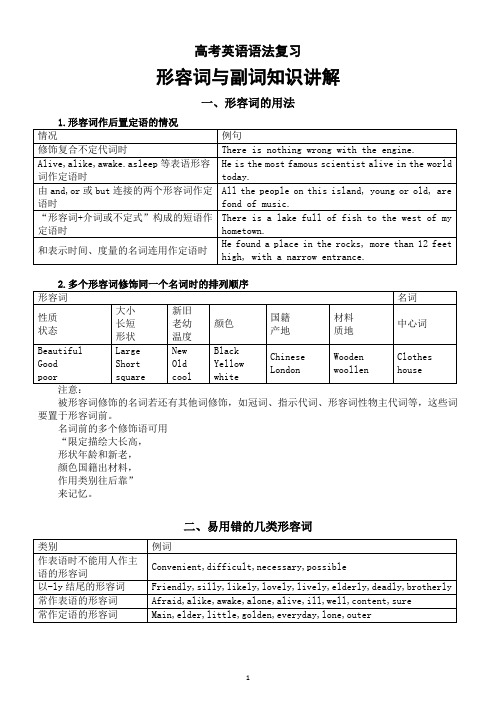
高考英语语法复习
形容词与副词知识讲解
一、形容词的用法
被形容词修饰的名词若还有其他词修饰,如冠词、指示代词、形容词性物主代词等,这些词要置于形容词前。
名词前的多个修饰语可用
“限定描绘大长高,
形状年龄和新老,
颜色国籍出材料,
作用类别往后靠”
来记忆。
二、易用错的几类形容词
三、形容词的比较等级
English is as interesting a subject as Chinese.
Which is the better of the two watches?
She is the taller of the two girls.
other或else把主语排除在比较对象之外;但如果不在同一范围比较则不需要用。
Susan is taller than any girl in her sister’s class.
四、副词的句法功能
五、副词的位置
六、副词比较等级的用法。
高中英语2024届高考复习核心形容词副词汇总(公平+积极消极+可能+熟悉+突然+严格)
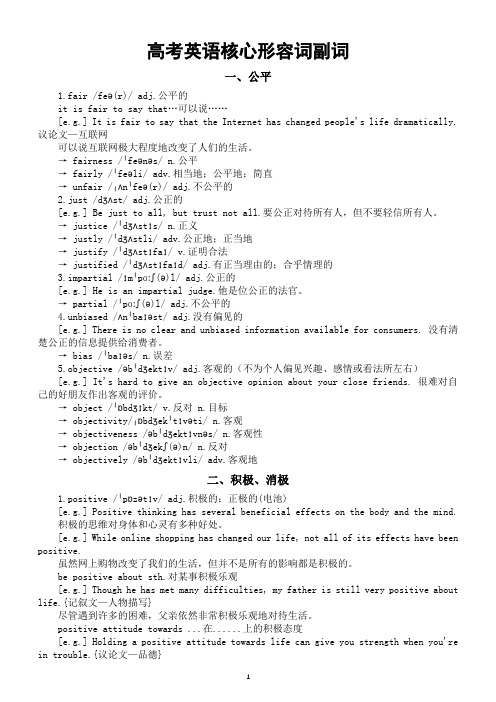
高考英语核心形容词副词一、公平1.fair /feə(r)/ adj.公平的it is fair to say that…可以说……[e.g.] It is fair to say that the Internet has changed people's life dramatically.议论文—互联网可以说互联网极大程度地改变了人们的生活。
→ fairness /ˈfeənəs/ n.公平→ fairly /ˈfeəli/ adv.相当地;公平地;简直→ unfair /ˌʌnˈfeə(r)/ adj.不公平的2.just /dʒʌst/ adj.公正的[e.g.] Be just to all, but trust not all.要公正对待所有人,但不要轻信所有人。
→ justice /ˈdʒʌstɪs/ n.正义→ justly /ˈdʒʌstli/ adv.公正地;正当地→ justify /ˈdʒʌstɪfaɪ/ v.证明合法→ justified /ˈdʒʌstɪfaɪd/ adj.有正当理由的;合乎情理的3.impartial /ɪmˈpɑːʃ(ə)l/ adj.公正的[e.g.] He is an impartial judge.他是位公正的法官。
→ partial /ˈpɑːʃ(ə)l/ adj.不公平的4.unbiased /ʌnˈbaɪəst/ adj.没有偏见的[e.g.] There is no clear and unbiased information available for consumers. 没有清楚公正的信息提供给消费者。
→ bias /ˈbaɪəs/ n.误差5.objective /əbˈdʒektɪv/ adj.客观的(不为个人偏见兴趣、感情或看法所左右)[e.g.] It's hard to give an objective opinion about your close friends. 很难对自己的好朋友作出客观的评价。
高考英语形容词与副词的用法

16. He couldn’t catch up with the thief though he had kept running, for he was ____ a child.
A. more than B. no more than
C. not less than
形容词、副词
语法复习(4)
一,形容词与副词 的定义
1,Ten strong young Chinese 2,the first beautiful little white Chinese wood bridge
副词/形容词的词序 限定词(all, both, those, your…)+数词形容词 ( first, three, next…)+描绘性形容词(beautiful, fine, kind…)+大小(large, small, big…)、长短 (long, short…)、高低等形体性形容词+新旧(new, old…)+颜色(red, green…)+国籍(Chinese…)+材 料(iron, stone…)+被修饰的名词
24. I have become ___and ____ in playing football.
A. much; much interesting B. more; more interested C. more; more interesting
ChDe. mckuchp;ominorte7i.n用te“re比ste较d 级+and+比较级”的
in Asia. China is larger than the other countries in Asia.
高中英语高考语法复习形容词与副词

高考英语形容词与副词一、形容词01 形容词的句法功能02 形容词的位置形容词作定语时一般置于被修饰词前作前置定语,下列情况中形容词通常后置于被修饰词。
(1)修饰something,anybody,nobody,anything等复合不定代词时There is nothing wrong with the machine.(机器什么问题都没有。
)(2)形容词词组作定语时She bought a book suitable for children.(她买了本适合孩子们的图书。
)(3)修饰表示数量的词要后置The baby is only five months old.(这个婴儿仅有五个月大。
)(4)enough作形容词修饰名词时,一般放在名词之前,也可放在名词之后We don't bring enough money.(我们没带够钱。
)There‘ll be time enough to relax when you’ve finished your work.(你完成工作后会有足够的时间来放松。
)[注]形容词常见于定语位置和表语位置,以上只列出几种常见情况讲解。
具体位置要视具体形容词及句子而定。
03 多个形容词修饰名词时的语序按以下顺序排列:(1)限定词(a/an,the,this,his,first,one...)(2)表示特征或性质等描述性形容词(good,pretty...)(3)表示大小、长短、高低的形容词(big,long,little...)(4)表示形状的形容词(round,square...)(5)表示年龄、新旧的形容词(old,young,new...)(6)表示颜色的形容词(red,yellow...)(7)表示国籍、地区、出处的形容词(America,southern,Italian...)(8)表示物质材料的形容词(wooden,woollen,glass...)(9)表示用途、类别的形容词(medical,writing...)a beautiful large green Chinese carpet一块漂亮宽大的绿色的中国地毯the first three days 头三天enormous black iron gates 巨大的黑色铁门04 形容词的特殊用法二、副词01 副词的种类根据词义可分为:(1)时间副词yesterday(昨天),today(今天),now(现在)等。
高考考研英语语法之形容词与副词篇
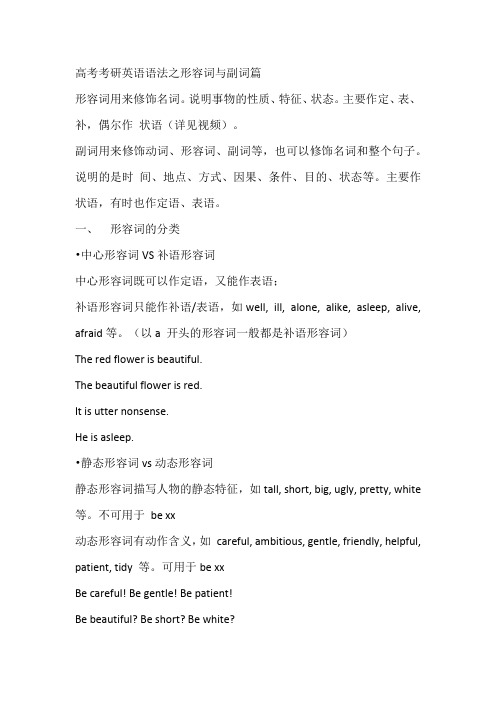
高考考研英语语法之形容词与副词篇形容词用来修饰名词。
说明事物的性质、特征、状态。
主要作定、表、补,偶尔作状语(详见视频)。
副词用来修饰动词、形容词、副词等,也可以修饰名词和整个句子。
说明的是时间、地点、方式、因果、条件、目的、状态等。
主要作状语,有时也作定语、表语。
一、形容词的分类•中心形容词VS补语形容词中心形容词既可以作定语,又能作表语;补语形容词只能作补语/表语,如well, ill, alone, alike, asleep, alive, afraid等。
(以a 开头的形容词一般都是补语形容词)The red flower is beautiful.The beautiful flower is red.It is utter nonsense.He is asleep.•静态形容词vs动态形容词静态形容词描写人物的静态特征,如tall, short, big, ugly, pretty, white 等。
不可用于be xx动态形容词有动作含义,如careful, ambitious, gentle, friendly, helpful, patient, tidy 等。
可用于be xxBe careful! Be gentle! Be patient!Be beautiful? Be short? Be white?•等级形容词vs非等级形容词等级形容词有比较、最高级。
例如:good, better, best非等级形容词不用于比较级。
例如:French food, atomic scientist, superior, inferior, perfect, excellent, extreme, vital二、形容词位置形容词一般前置,修饰不定代词时后置:It was a rainy day, and something important happened.多个定语并列,可不用and,但必须按照特定顺序一一县官行令谢国才a nice long new red Chinese plastic pen三、形容词特殊用法形容词+介词短语:be afraid of, be accustomed to, be content with, be dependent un, be good at, be famous fbr? be sick of, be worthy of, be true to...形容词+ 不定式:be glad to, be impossible to, be disappointed to, be anxious to...四、副词的分类•方式副词:angrily, happily, politely, coldly, warmly, quickly•程度副词:almost, awfully, completely, considerably, greatly, hardly •时间副词:already, before, early, late, finally, today, yesterday•频率副词:always, constantly, hardly, ever, never, often, rarely, seldom•地点副词:above, below, up, down, here, there, home•连接副词:therefore, however, moreover, thus•解说副词:as, namely五、副词的用法副词主要用来作状语,位置较灵活。
- 1、下载文档前请自行甄别文档内容的完整性,平台不提供额外的编辑、内容补充、找答案等附加服务。
- 2、"仅部分预览"的文档,不可在线预览部分如存在完整性等问题,可反馈申请退款(可完整预览的文档不适用该条件!)。
- 3、如文档侵犯您的权益,请联系客服反馈,我们会尽快为您处理(人工客服工作时间:9:00-18:30)。
高中英语语法复习天津市汉沽区第五中学刘华(一) 形容词、副词的作用与位置1. 形容词是用来修饰名词的,常被放在名词前作定语或放在系动词后面作表语。
He is a young man.He is young.2.副词则用来修饰形容词、动词、其他副词或者句子,一般位于形容词之前,动词之后或句子之首。
It’s very good.He runs fast.I’m very well.He has not been to Japan recently.以下属几种特殊情况,须牢记:1.形容词短语作定语,定语后置。
a language difficult to mastera leaning tower about 180 feet high2. 表语形容词(afraid , alike , alone , asleep, awake , alive 等)作定语,定语后置如a man alive有些表身体健康状况的形容词如well , faint ,ill 只作表语。
sick既可作表语又可作定语,ill 如作定语意为“bad” 。
3. 形容词用作定语,修饰不定代词通常后置。
Something important4. else 常用作疑问代词和不定代词的后置定语。
What else, somebody else.5. enough 修饰名词前置.I have enough money to buy this book .但enough 修饰形容词、副词时必须后置。
He runs fast enough.This book is good enough.6. 几个副词并列作状语时,其顺序较灵活,一般是:方式-地点-时间。
We had a good time together outdoors last Sunday.7. 频度副词often , always , usually 等放在be 之后、行为动词前。
He is always working hard.8. 副词作定语,定语后置。
The people there are friendly9. 多个形容词修饰同一名词的顺序。
限定词(冠词、指示代词、不定代词、物主代词)数(序数词、基数词)形(大小、长短、形状)记住:限-数-描-形-龄-色-国-材(+名词)一个漂亮的崭新中国式陶瓷大花瓶。
a nice big new Chinese china vase .10. 以-ly 结尾的词性辨析1)下列单词以-ly 结尾(并非副词lively , lonely , lovely deadly ,friendly ugly ,silly , likely.2) 空间与抽象close-closely, high-highly , low –lowly , deep-deeply 3)有无ly 意义大不相同的副词dead –deadly(完全绝对) late –lately (最近)(二)复合形容词的构成1.形+名+ed kind -hearted white –haired2.形+形red –hot dark –blue3.形+现分good –looking easy –going4.副词+现分hard –working fast –moving5.副词+过分hard –won newly –made6.名+形life –long world –famous7.名+现分peace –loving fun –loving8 . 名+过分snow –covered hand –made9. 数+名+ed four storeyed three –legged10. 数+名ten-year two -man(三)形容词与副词的比较等级1.原级的构成和用法构成:形容词、副词的原级即本身用法:表示双方在程度、性质、特征等方面相等时用“as + 原级+as ”不等时用“not so /as + 原级+as ”倍数用“倍数+as + 原级+as ”Xiao Wang is as tall as Xiao Yu .This building looks not so /as high as that one .Miss Liu speaks English as fluently as you.This room is three times as large as that one .2. 比较级和最高级的构成1)规则形容词、副词的比较级和最高级2)不规则的形容词、副词的级要特殊记。
good / well -bad / ill -many / much -little -far -old -3. 比较级的用法1)双方比较,表示一方超过另一方时,用“比较级+than“ 的结构如This picture is more beautiful than that one .2)表示一方不及另一方时,用“less + 原级+than”结构This room is less beautiful than that one.3) 表示一方在程度或数量上超过另一方时,可在比较级前加表示程度的状语,如even , a lot , a bit , a little,still, much , far , yet ,by far等修饰。
如he works even harder than before注意:by far通常用于强调最高级。
用于比较级一般放在比较级的后面,若放在前面,应在二者中间加the .如:He is taller by far than his brother .He is by far the taller of the two brothers .4)表示一方随另一方的程度而变化时,用“the+ 比较级(主语+谓语), the +比较级(主语+谓语)结构(越….,就越…)The harder he works , the happier he feels. 5) 不与其他事物相比,表示本身程度的改变时,用“比较级+and + 比较级”结构(越来越…)。
The girl becomes more and more beautiful.The weather is getting colder and colder.6)某些以-ior结尾的形容词进行比较时,用to 代替than . 这些词有inferior (劣等的,次的),superior , junior(资历较浅的), senior 。
如:He is superior to Mr Zhang in chemistry.He is senior to me7) 倍数表达法A is + 倍数the size ( height / length /width /depth ) ofB A is + 倍数+as …as BA is + 倍数+比较级than B注意:times 表三倍以上,两倍用twice / double译:我们的学校比他们的学校大三倍。
(三种方法)4 最高级的用法1)三者或三者以上相比,表示最高程度时,用“the + 最高级”的结构表示。
这种句式一般常有表示比较范围的介词短语。
如:ZhangHua is the tallest of the three .He works (the ) hardest in his class .2) 最高级可被序数词以及much , by far , nearly , almost , by no means , not quite , not really , nothing like (没有什么能比得上)等修饰。
This hat is by far the biggest .How much did the second most expensive hat cost ?3) 表示“最高程度”的形容词,如excellent , extreme, perfect等没有最高级,也没有比较级。
4)形容词最高级修饰作表语或介词宾语的名词、代词时,被修饰的的词往往省略。
如:He is the tallest (boy)in his class .5) 作状语的副词最高级前可以不加定冠词。
He runs (the )fastest in his class5. 由as / so 组成的形容词或副词短语。
1)as much as + 不可数名词数量(多达…)。
如:Each stone weighs as much as 15 tons .She could earn as much as ten dollars a week .2) as many as + 可数名词数量(多达…)。
如:I have as many as sixteen reference books.3) as early as 早在As early as the twelfth century the English began to invade the island .4) as far as 远道,就… 而言We might go as far as the church and back .As far as I know , he has been there before .5) may / might as well 不妨,不如Then you might as well stay with us here .6) as … as sb can be 到了最…的程度,极其They are as unreliable as they can be . ( 他们极其不可信)7) as … as one can = as … as possible ( 尽某人可能)He began to run as fast as he could6. 几组重要词语辨析1)very 和much 的区别可分等级的形容词和副词前使用very 不用much . 表示状态的过去分词前用very 。
a very frightened boy ; a very tired childa very complicated problem以-ing , -ed 结尾的分词多用much , very much , greatly 修饰。
We were greatly shocked by the news about Tom. too 前用much 或far , 不用very ,You are much / far / a lot too nice.注意:修饰绝对意义的形容词,一般不用very , 而用quite, completely , well , entirely 等修饰。
